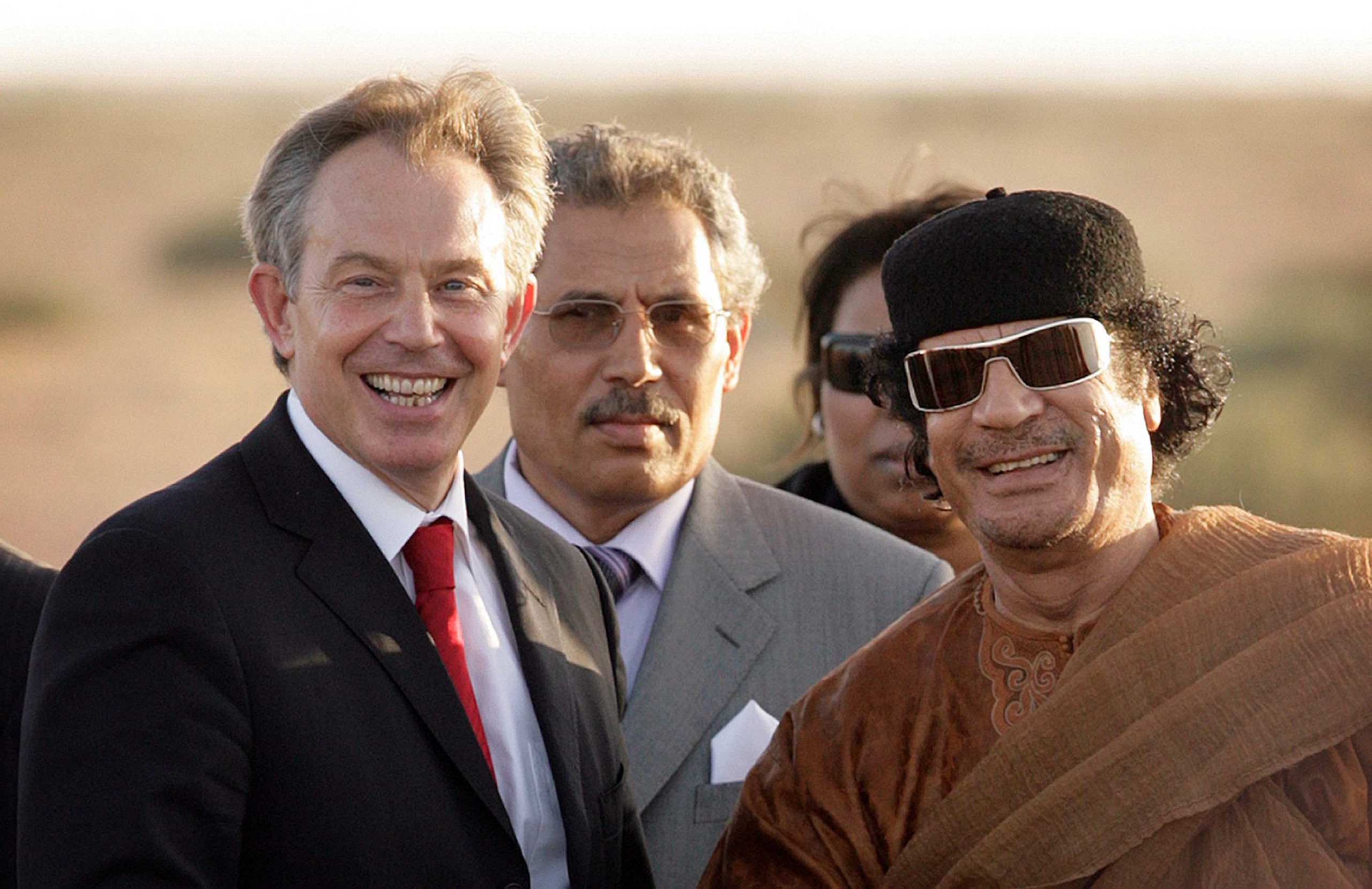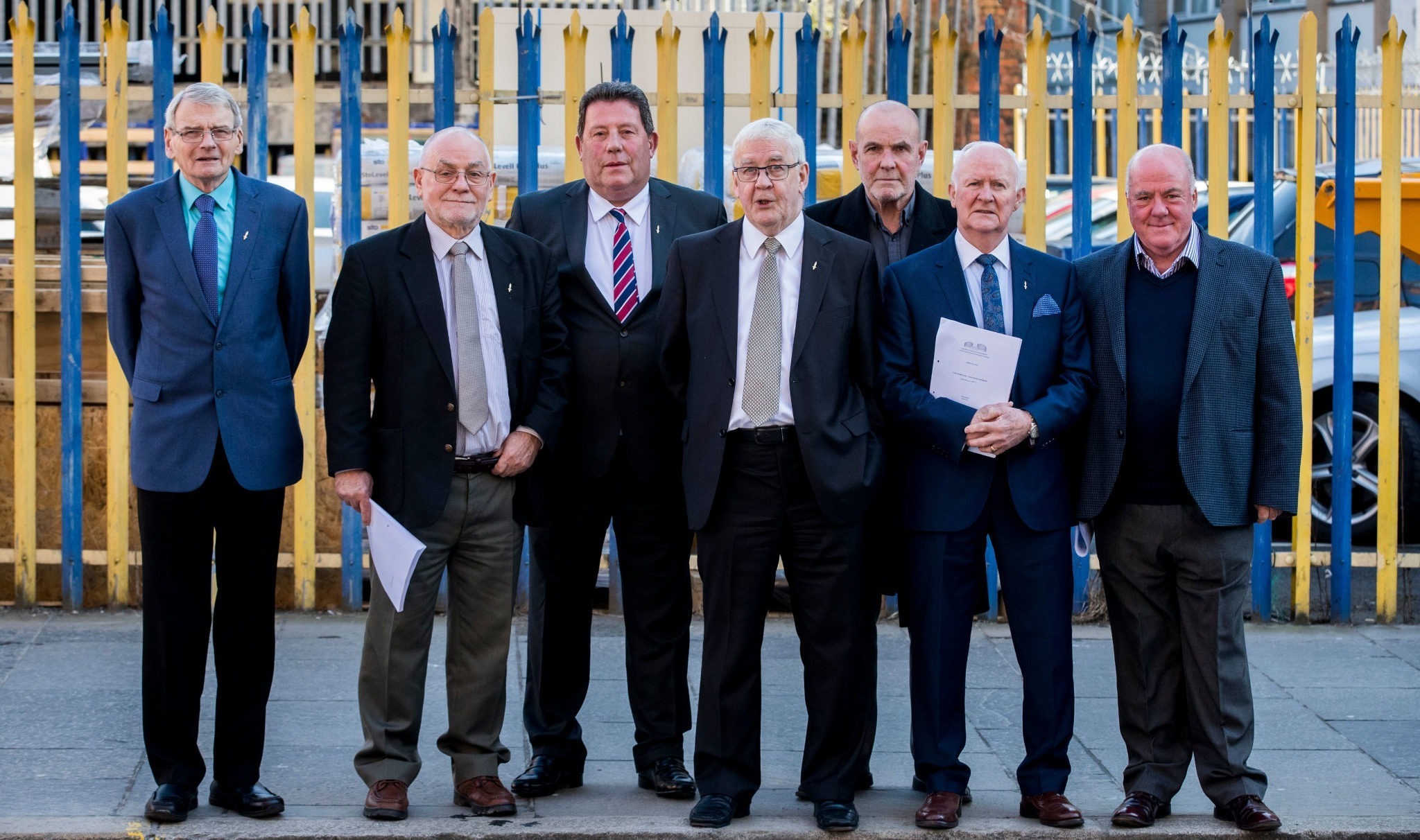Their role, and desperate attempts at denial, notably in seizing two Libyan dissidents and handing them over to the Libyan dictator, Muammar Gaddafi’s secret police, is one of the most shameful episodes in the recent history of Britain’s foreign adventures. And it is far from reaching a conclusion.
British ministers continue to break a promise to set up an independent inquiry into the outrage, preferring to spend millions of pounds in out-of-court settlements to suppress the truth about their role in the rendition of the Libyans, their families and others including British nationals and residents who were secretly flown to the US military prison in Guantanamo Bay.
In December 2005, Jack Straw, then foreign secretary in Tony Blair’s government, told MPs:
“Unless we all start to believe in conspiracy theories and that the officials are lying, that I am lying, that behind this there is some kind of secret state which is in league with some dark forces in the United States… there simply is no truth in the claims that the United Kingdom has been involved in rendition.”
Straw was wrong. He was responsible for MI6 which for years, with MI5, had been colluding in rendition operations, handing over suspects allegedly involved in the “war on terror” to CIA black (secret) prison camps.
The British parliament’s Intelligence and Security Committee (ISC), made up of backbench MPs and peers vetted and hand-picked by the prime minister, initially cleared MI6 and MI5 of any role in the US-led operations, saying only that the British agencies were slow in realising what the CIA was up to, abusing and torturing prisoners held without charge. The ISC accepted the assurances. It, too, was seriously misled.
Five days after the 9/11 attacks on the US in September 2001, senior MI6 officers were told at a meeting in the British embassy in Washington that the CIA intended to abduct any individuals it suspected of being al-Qaeda sympathisers. As early as January 2002 they were also told that British citizens were “possibly being tortured” after capture by US forces in Afghanistan, that the United States was planning to hold some indefinitely without trial, and that British military lawyers were complaining about breaches of the Geneva conventions.
Libyan abductions
Britain’s role in the torture of Abdul-Hakim Belhaj and Sami Al-Saadi, senior members of the Libyan Islamic Fighting Group, an anti-Gaddafi body well known to British intelligence, came to light because of documents found among the ruins of the office of Moussa Koussa, Gaddafi’s intelligence chief. It was destroyed by bombs, perhaps even British ones, during Nato air strikes on the Libyan capital in 2011.
Among the documents discovered by enterprising journalists was an ingratiating and now notorious letter from Mark Allen, MI6’s counter-terrorism chief, to Moussa Koussa dated 18 March 2004. Allen congratulated Gaddafi’s intelligence chief on Belhaj’s “safe arrival” in Tripoli, making it clear his capture was the result of British intelligence. He added: “This was the least we could do for you and for Libya to demonstrate the remarkable relationship we have built over the years.”
Allen and his new Libyan friend were preparing for what became known as the “Deal in the Desert” involving lucrative deals for British companies, in particular oil giant BP.
After offering compensation to his victims and giving up his chemical and nuclear weapons projects, the villain of Lockerbie, the murderer of the British policewoman Yvonne Fletcher, the supplier of weapons and Semtex explosives to the IRA, had become a feted friend.
Urged on by their political masters, MI6 and MI5 ignored evidence reported by Amnesty International, Human Rights Watch, the US State Department and Britain’s own Home Office that torture remained endemic in Gaddafi’s Libya, meted out especially to those perceived to be opponents of his regime.
The relationship had become so cosy that in June 2007 Tony Blair wrote a personal letter to Gaddafi praising him for leading “a genuine transformation in relations between our two countries… from which both our peoples stand to benefit”. Prince Charles also wrote to the Libyan dictator. “Dear Excellency”, he said, “I have been briefed on the positive way in which relations between Libya and the United Kingdom are developing.”
Blair has insisted he had “no recollection” of the Libyan abductions. Yet according to impeccable Whitehall sources Eliza Manningham-Buller, the head of MI5, wrote to Blair complaining about the conduct of MI6 officers in Libya, saying their actions had threatened Britain’s intelligence-gathering, and may have compromised the security and safety of MI5 officers and their informants.
Manningham-Buller was so incensed when she discovered the role played by MI6 that she banned its officers, including most senior ones, from MI5’s headquarters, Thames House. She was said by official sources to have been “shocked and appalled” by the treatment of Belhaj and Al-Saadi.
The Gibson enquiry
An inquiry into the UK’s role in rendition and torture led by Sir Peter Gibson, a retired appeal court judge, had already been set up following evidence of MI5 collusion in the case of a British resident, Binyam Mohamed.
US defence officials claimed Mohamed was involved in a “dirty bomb” plot. It was nonsense. The accusation was based on the claims, since retracted, by a fellow detainee, Abu Zubaydah, a Palestinian who had been subjected to torture. He was waterboarded at least 83 times by CIA agents. He began to tell the truth only when the torture stopped.
MI6 officers were aware of the treatment meted out to Zubaydah. An MI6 officer was also aware of the torture of Ibn al-Sheikh al-Libi, who was placed in a sealed box by CIA agents in Afghanistan. MI6 fed questions to CIA agents interrogating al-Libi who under torture made the entirely false claim that Iraqi leader Saddam Hussein had approached Al-Qaeda about his nuclear weapons programme, a claim used by Blair to help justify the invasion of Iraq.
The Gibson inquiry reported that MI6 officers appeared to be under no obligation to report breaches of the Geneva conventions, even when individual MI6 and MI5 officers expressed concerns about the abuse of detainees, including sleep deprivation, hooding and waterboarding, for “fear of damaging liaison relationships” — a reference to the CIA.
Gibson obtained documentary evidence identifying 200 reported cases of the UK’s alleged involvement in the mistreatment of detainees.
The inquiry was halted in 2013 in light of media reports and concern by a number of MPs about the new evidence of MI6 and MI5 wrongdoing exposed by the Allen letter and other incriminating documents found in Tripoli.
Soon after the British role in the Libyan cases came to light, London’s Metropolitan Police issued a statement saying that the allegations of ill-treatment were “so serious that it is in the public interest for them to be investigated now”.
Four years later it handed a file of nearly 30,000 pages to the Crown Prosecution Service (CPS). It provoked huge argument among the agency’s lawyers. Some were convinced there should be a prosecution; most backed off. One problem was that the CPS cannot bring a charge against “government policy”. That was a convenient let-off.
In the summer of 2016, the CPS announced that neither Straw nor Allen would face charges although, it said, Allen had “sought political authority for some of his actions albeit not within a formal written process nor in detail”.
The CPS went out of its way to explain: “Officials from the UK did not physically detain, transfer or ill-treat the alleged victims directly, nor did the suspect have any connection to the initial physical detention of either man or their families.” [emphasis added]
It added that it was “impossible to reconcile conflicting evidence about what happened at the time and shortly afterwards or to prove each element of the offences to the required criminal standard.”
Demand for full disclosure
The government went to extraordinary lengths to prevent evidence of MI6’s wrongdoing being heard in court, even arguing that the reasons why the CPS decided not to prosecute had to be kept secret. Britain’s most senior judges disagreed. As they threatened to demand full disclosure about what MI6 and MI5 had been up to, the government backed down.
In May 2018, it announced it had reached a “full and final settlement” out of court with Belhaj, including £500,000 in compensation for his wife, Fatima Boudchar. (Al-Saadi had already accepted £2.2-million from the government. Belhaj had always said he was interested in an apology and acceptance of wrongdoing by the British state, not money.)
The government told MPs it apologised “unreservedly and unequivocally” for its role in what it called the “deeply troubling and appalling treatment” of Belhaj and his pregnant wife. The attorney general, Jeremy Wright QC, told the Commons that the settlement included “no admission of liability”, adding that “cultural” and “behavioural” changes in MI5 and MI6 were needed — as though the security and intelligence agencies still had not learned from their past misdeeds.
Straw issued a statement of his own. It read: “On 1 March 2004 my approval was sought for some information to be shared with international partners… In rare cases of great urgency, oral submissions could be made and oral approvals given by me. This is what happened on this occasion.” Why the case was “of great urgency” was not explained.
Blair again distanced himself from the Belhaj rendition. “I did not know about the case until after I left office in 2007”, he said. “It was not brought to my attention. It was not something I dealt with in government”.
232 cases
The case was passed to the Intelligence and Security Committee, the body that had been misled so much in the past by MI6 and MI5. The ISC finally published two reports on Britain’s role in counter-terror rendition operations in June 2018.
It found 232 cases where British security and intelligence officers continued to help their counterparts abroad even after they knew or suspected mistreatment. In 198 cases they received intelligence from foreign agencies which had been obtained from detainees who they knew had been mistreated or should have suspected mistreatment.
In 22 cases, MI6 or MI5 provided intelligence to enable a rendition operation to take place, and in 23 cases, they failed to take action to prevent a rendition — including instances where there were opportunities to intervene and prevent the rendition of a British national or resident.
In a devastating passage, the ISC confirmed that immediately after 9/11, the heads or deputies of MI6 and MI5 had been briefed by the CIA. The committee found that there were at least 38 cases in 2002 when MI6 and MI5 were told their officers witnessed or heard about mistreatment.
It continued: “The agencies argue that these were ‘isolated incidents’: they may have been isolated incidents to the individual officer witnessing them, but they cannot be considered ‘isolated’ to those in Head Office. It is difficult to comprehend how those at the top of the office did not recognise the pattern of mistreatment by the US.”
The ISC went on: “The same is true of rendition: there was no attempt to identify the risks involved and formulate the UK’s response. There was no understanding in HMG of rendition and no clear policy — or even recognition of the need for one.” The British government “tolerated actions, and took others, that we regard as inexcusable”, the committee concluded.
A footnote in the ISC report also revealed that three British intelligence officers were deployed to Abu Ghraib, the notorious US jail in Iraq.
Straw said: “Although I was formally responsible for both SIS [MI6] and GCHQ during my period as foreign secretary [June 2001 to May 2006], I have… learned much about the activities and the approach of these agencies of which I was not aware before”.
In its second report on what it called “current issues”, the ISC concluded: “There is no clear policy and not even agreement as to who has responsibility for preventing UK complicity in unlawful rendition. We find it astonishing that, given the intense focus on this issue 10 years ago, the government has still failed to take action”.
Theresa May, then the prime minister, blocked the committee’s request to hear from four MI6 officers described as being “central to events”. The ISC said that if it had continued its inquiry, it would have called on Straw to give evidence. Yet the committee could have demanded to hear evidence from Straw and Sir Richard Dearlove, head of MI6 at the time, but failed to do so. It did not explain why.
In October 2018, the all-party parliamentary group on Extraordinary Rendition concluded that Britain’s “anti-torture policy” was still “insufficient to prevent a repeat of UK involvement in rendition and torture”. It called for much better protection for whistleblowers reporting cases of torture or mistreatment.
Separate internal guidelines drawn up by the Ministry of Defence state that Britain would not share information with allies when there was a “serious risk” of torture. However, they said this could be overridden “if ministers agree that the potential benefits justify accepting the risk and the legal consequences that may follow”.
Successive governments for years covered up Britain’s complicity in torture. Loopholes remain in the guidance to security and intelligence officers and to British forces abroad. What is needed is a full independent inquiry into Britain’s role in the past and its policy now.



